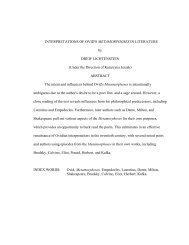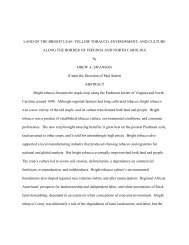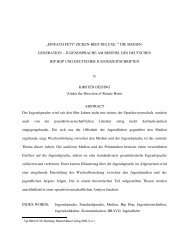RED BOAT TROUPES AND CANTONESE ... - University of Georgia
RED BOAT TROUPES AND CANTONESE ... - University of Georgia
RED BOAT TROUPES AND CANTONESE ... - University of Georgia
Create successful ePaper yourself
Turn your PDF publications into a flip-book with our unique Google optimized e-Paper software.
school choir, playing in the brass band, or string orchestra were acceptable activities in the eyes<br />
<strong>of</strong> students. Many “English schools” were Catholic schools run by priests and nuns from<br />
Western countries, or those who had been trained in foreign countries. “Chinese schools” leaned<br />
on Confucianism and on the Chinese moral and education system. Since Hong Kong has<br />
become a British colony in 1842, a person’s social status, and hence, wealth, seemed directly<br />
related to his/her English speaking and reading ability. Although “Chinese school” students<br />
were considered <strong>of</strong> inferior social class in the eyes <strong>of</strong> their “English school” counterparts,<br />
listening to Western pop music was still the trend for these students.<br />
Most teenagers would not admit that they like Cantonese opera, even if they did, because<br />
parents or grandparents listened to the phonograph records. They refrained from telling their<br />
friends; otherwise they would be teased. If they wanted to sing an aria, they only did it in the<br />
shower, or at home. In my high school years, when friends called, grandma would tell them on<br />
the phone that I had gone to coeng je (singing stuff) when I was at the high school choir<br />
rehearsal. My friends later told me how they laughed after hanging up the phone. In her days<br />
living in the estuary, grandma had heard blind women and men singing on the street, low class<br />
music for donations to buy food. She also heard opera in the performance halls, but no Western<br />
choir singing. There was just no vocabulary with which she could describe choir practice except<br />
for what had commonly been used in her village that referred to low class musical performance,<br />
coeng je. My singing activity is still called coeng je by family members for fun.<br />
Many performers continued to sing opera as well as take part in the movie industry after<br />
WWII in Hong Kong. One <strong>of</strong> the most successful fa dan was Fong Yim Fun in the early 1950s.<br />
Under her leadership, many new operas were premiered between 1954 and 1956. 142 Tong Dik<br />
Sung (1917-1959) wrote librettos for her productions before Fong left the stage to get married.<br />
142 Sau Y. Chan, Hong Kong Yuet Kek koi syut: 1900-2002, v.<br />
67






